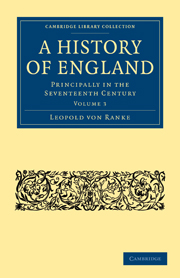Book contents
- Frontmatter
- Contents
- BOOK XI THE COMMONWEALTH IN ENGLAND, 1649—1653
- BOOK XII THE PROTECTORATE OF OLIVER CROMWELL, 1653–1658
- BOOK XIII FALL OF THE PROTECTORATE AND THE COMMONWEALTH. RESTORATION OF THE MONARCHY, 1658—1660
- INTRODUCTION
- CHAP. I Attempt to continue the Protectorate
- CHAP. II Attempt to form a Commonwealth on a new basis
- CHAP. III Royalist movements in the summer of 1659
- CHAP. IV Supremacy and constitutional projects of the Army
- CHAP. V Lambert and Monk. Restoration of the Rump Parliament
- CHAP. VI Anti-republican movement. Monk in the City
- CHAP. VII Recall of the King
- BOOK XIV THE FIRST FIVE YEARS UNDER CHARLES II. THE RESTORATION OF THE ANGLICAN CHURCH
- BOOK XV THE DUTCH WARS OF CHARLES II. ESTABLISHMENT OF THE PROTESTANT AND PARLIAMENTARY CHARACTER OF THE CONSTITUTION 1664—1674
CHAP. III - Royalist movements in the summer of 1659
Published online by Cambridge University Press: 07 June 2011
- Frontmatter
- Contents
- BOOK XI THE COMMONWEALTH IN ENGLAND, 1649—1653
- BOOK XII THE PROTECTORATE OF OLIVER CROMWELL, 1653–1658
- BOOK XIII FALL OF THE PROTECTORATE AND THE COMMONWEALTH. RESTORATION OF THE MONARCHY, 1658—1660
- INTRODUCTION
- CHAP. I Attempt to continue the Protectorate
- CHAP. II Attempt to form a Commonwealth on a new basis
- CHAP. III Royalist movements in the summer of 1659
- CHAP. IV Supremacy and constitutional projects of the Army
- CHAP. V Lambert and Monk. Restoration of the Rump Parliament
- CHAP. VI Anti-republican movement. Monk in the City
- CHAP. VII Recall of the King
- BOOK XIV THE FIRST FIVE YEARS UNDER CHARLES II. THE RESTORATION OF THE ANGLICAN CHURCH
- BOOK XV THE DUTCH WARS OF CHARLES II. ESTABLISHMENT OF THE PROTESTANT AND PARLIAMENTARY CHARACTER OF THE CONSTITUTION 1664—1674
Summary
Like all crises in revolutionary epochs, the overthrow of the Protectorate materially altered the position of parties.
In the first place it did more to revive the hopes of the Royalists than even the death of Cromwell. Not only did the whole system, which had crushed them and deprived them of their rights as citizens, seem to be tottering to its fall, but they found allies whom otherwise they could never have hoped to gain.
The Presbyterians, whom Oliver Cromwell had conciliated and all but won over to his side, were naturally opposed to the new government, from whose Anabaptist leanings they could expect nothing but oppression and persecution. As a party they were still numerous and influential. They reckoned among their adherents the great majority of the towns, and above all the capital, which was only prevented from declaring itself by the prudence of the authorities. Those members of Parliament who had been forcibly expelled in 1648 now formed a rallying point for the agitators. The restoration of those who had enjoyed their seats down to 1653 reminded them that they too had rights which had been violated. Some few even made the attempt to establish their claims single-handed: they pleaded that if it were the good old cause that was in question, it was most adequately represented by the majority of the old Parliament, which had been violently dissolved at the very moment when they contemplated a reconciliation with the King, and not by the factious minority, through whose excesses it was that the privileges of Parliament had been violated.
- Type
- Chapter
- Information
- A History of EnglandPrincipally in the Seventeenth Century, pp. 242 - 250Publisher: Cambridge University PressPrint publication year: 2010First published in: 1875

